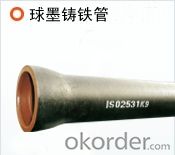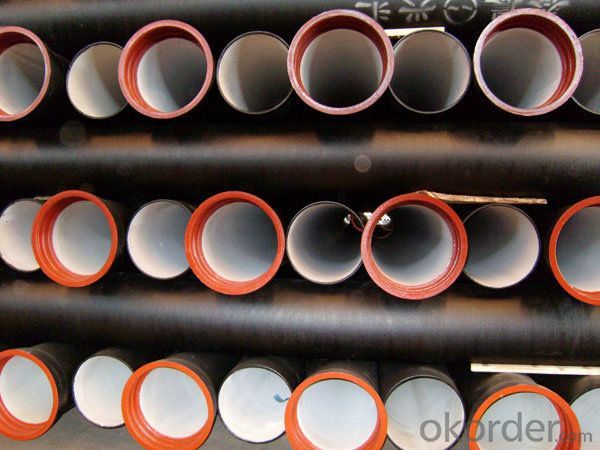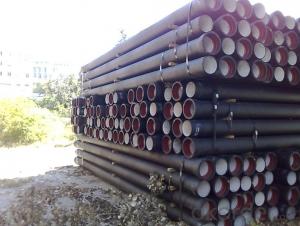Ductile Iron Cast Iron Pipe of China DN400-DN1000 EN545/EN598/ISO2531
- Loading Port:
- China main port
- Payment Terms:
- TT or LC
- Min Order Qty:
- 20 m.t.
- Supply Capability:
- 50000 m.t./month
OKorder Service Pledge
OKorder Financial Service
You Might Also Like
1,Ductile Iron Pipe Description :
1) Pipes confirm to ISO2531,K9 class,T type joint,6m long,with inside cements lining conform to ISO4179, outside Zinc spraying(130g/m2) and bitumen coating(70μm) conform to ISO8179.
2) Pipe ends: Spigot and socket ends, with 100% SBR rubber gaskets accoding to ISO4633
3) we can do third party inspection according to customer's request.
4) Our products have been sold to many international market,such as Middle East and South East Asia and Africa.
2,Main Features of the Ductile Iron Pipe:
Material: Ductile iron grade 500-7/ 450-10 in accordance with ISO1083
Standard: ISO 2531, EN545, EN598, ANSI, AWWA
Certificate: ISO9001, ISO14001, SGS, NSF, WRAS
Test: In accordance with ISO 2531 / EN 545 / EN598 and 100% water pressure test
Length: 6m or cut into 5.6m, 5.7m, 5.8m
Internal Lining: Cement, conform to ISO4179
External coating: Zinc + Bitumen, conform to ISO8179
Rubber: NBR, SBR, EPDM according to ISO4633 / EN681.1
Note: The gaskets, bolts & nuts are supplied respectively as your special requirement
3,Ductile Iron Pipe Images:


4. Ductile Iron Pipe Specification
Internal lining: ductile iron pipes shall have an internal cement mortar lining in acc with ISO4179.
External coating: ductile iron pipes shall be externally coated with metallic zinc spray plus a further layer of resin painting to ISO8179.
Gasket: 100% SBR/NBR/EPDM rubber gasket in accordance with ISO4633.
Packing: ductile iron pipes from DN100 to DN300 be bundled with steel belts, others are in bulk.
Payment term: L/C, T/T.
Packing: In bulk vessel or in container
5.FAQ:
We have organized several common questions for our clients,may help you sincerely:
1.Q: Why would you choose ductile iron pipe rather than other pipe materials?
A:The reasons are obvious for that not only ductile iron pipe possesses the inherent strength and flexibility of ductile iron, combined with proven corrosion protection systems, but also the cost savings can be achieved from design to installation and commissioning.
2.Q:Why can you guarantee the inner of pipes can’t be corroded?
A: High alumina cement mortar lining and sulphate-resistant cement mortar lining. These two special linings are applicable to inner anti-corrosion for sewage pipes, improving resistance to erosion of the sewage components.
- Q:Can ductile iron pipes be used for trenchless pipe rehabilitation methods?
- Yes, ductile iron pipes can be used for trenchless pipe rehabilitation methods. Trenchless methods such as cured-in-place pipe lining or pipe bursting can effectively repair and rehabilitate ductile iron pipes without the need for extensive excavation. These methods provide a cost-effective and efficient solution for rehabilitating aging or damaged ductile iron pipes while minimizing disruption to the surrounding environment.
- Q:What is the expected external coating for ductile iron pipes?
- The expected external coating for ductile iron pipes is typically a protective layer that is applied to the exterior surface of the pipe to prevent corrosion and extend its lifespan. Some common types of external coatings for ductile iron pipes include polyethylene, polyurethane, and epoxy coatings. These coatings provide a barrier between the pipe and the surrounding environment, preventing the pipe from coming into contact with corrosive substances such as soil, water, and chemicals. The choice of coating depends on factors such as the intended application, soil conditions, and the level of corrosion protection required. Overall, the expected external coating for ductile iron pipes is designed to ensure the longevity and durability of the pipes in various environmental conditions.
- Q:How long do ductile iron pipes last?
- Ductile iron pipes are known for their durability and long lifespan. On average, these pipes can last anywhere between 80 to 100 years, with some even lasting up to 150 years. The longevity of ductile iron pipes is attributed to their robust construction, which enables them to withstand high-pressure environments, resist corrosion, and endure extreme weather conditions. Additionally, ductile iron pipes have a proven track record of reliability and performance, making them a popular choice for water and wastewater infrastructure projects worldwide. Regular inspection and maintenance can further extend the lifespan of ductile iron pipes, ensuring their continued service for many decades.
- Q:Can the sealing ring of ductile iron pipe be reused?
- It is better not to have used things, easy aging, sealed, the best to use new
- Q:Are ductile iron pipes suitable for bridge crossings or crossings under roadways?
- Yes, ductile iron pipes are suitable for bridge crossings or crossings under roadways. Ductile iron pipes are known for their strength, durability, and resistance to external forces such as heavy traffic loads or bridge movements. They have a high tensile strength and can withstand the stress and strain caused by the weight of vehicles passing over them. Additionally, ductile iron pipes are highly corrosion resistant, making them suitable for underground installations where they may be exposed to water or other corrosive elements. Moreover, these pipes have a long lifespan and require minimal maintenance, making them a reliable choice for bridge crossings or crossings under roadways. Overall, ductile iron pipes provide a cost-effective and efficient solution for such infrastructure projects.
- Q:Are ductile iron pipes suitable for high-temperature applications?
- Ductile iron pipes are generally not suitable for high-temperature applications. While ductile iron is known for its strength and durability, it has limitations when it comes to high temperatures. Ductile iron pipes are typically rated for a maximum operating temperature of around 250-300 degrees Fahrenheit (120-150 degrees Celsius). At higher temperatures, ductile iron pipes can experience thermal expansion, which may lead to cracking or distortion. This can compromise the structural integrity of the pipe and potentially cause leaks or failures. Additionally, ductile iron is susceptible to oxidation at elevated temperatures, which can further degrade the pipe's performance over time. For high-temperature applications, it is generally recommended to use materials specifically designed for such conditions, such as stainless steel or high-temperature alloys. These materials offer better resistance to thermal expansion, oxidation, and other factors associated with high temperatures.
- Q:How do ductile iron pipes perform in high-pressure applications?
- Ductile iron pipes are known for their exceptional strength and durability, making them highly suitable for high-pressure applications. These pipes are designed to withstand immense internal and external pressures, making them well-suited for underground or above-ground installations where high-pressure conditions are expected. One of the key advantages of ductile iron pipes in high-pressure applications is their ability to resist cracking or bursting. The inherent ductility of the material allows it to absorb and distribute the pressure evenly, minimizing the risk of failure under high-pressure conditions. This makes ductile iron pipes a reliable choice for water supply systems, oil and gas pipelines, and other applications where the pipe is subjected to significant pressure. Additionally, ductile iron pipes have excellent corrosion resistance properties, which further enhances their performance in high-pressure environments. The pipes are typically coated with a protective layer, such as cement mortar or epoxy, which acts as a barrier against corrosion. This protective coating prevents the formation of rust or scale inside the pipe, ensuring a smooth flow and maintaining the structural integrity even under high-pressure conditions. Furthermore, ductile iron pipes have a high tolerance for external loads, such as soil pressure, traffic loads, or other external forces. This strength enables them to withstand the additional stress that may be present in high-pressure applications, ensuring the long-term reliability and performance of the pipe system. Overall, ductile iron pipes offer exceptional performance in high-pressure applications. Their strength, durability, corrosion resistance, and ability to withstand external loads make them a reliable choice for various industries and infrastructure projects where high-pressure conditions are a concern.
- Q:How does ductile iron pipe handle temperature changes?
- Ductile iron pipe is designed to handle temperature changes effectively. Its composition and structure make it highly resistant to thermal expansion and contraction, minimizing the risk of damage. This property allows the pipe to withstand extreme temperature variations without compromising its structural integrity, making it a reliable choice for various applications where temperature fluctuations are common.
- Q:Are ductile iron pipes suitable for installation in rocky or hard soil conditions?
- Ductile iron pipes are a great choice for rocky or hard soil conditions. They are known for their strength and durability, which makes them perfect for challenging soil conditions. These pipes have a high tensile strength, allowing them to handle external loads and pressures, even when there are rocks or hard soil present. Furthermore, they are resistant to corrosion, making them even more suitable for installation in such conditions. The pipes' flexibility and ability to withstand bending stresses also make them reliable for rocky or hard soil conditions, as they can adapt to ground movement without compromising their structural integrity. Overall, ductile iron pipes are the preferred option for installations in challenging soil conditions because of their robustness, longevity, and resilience.
- Q:Can ductile iron pipes be used in marine environments?
- Ductile iron pipes are suitable for marine environments due to their excellent mechanical properties, high corrosion resistance, and durability. These pipes are made of a type of cast iron known as ductile iron, which can withstand the harsh conditions of marine environments. Marine environments are known for their high levels of corrosion caused by saltwater, humidity, and other harsh factors. However, ductile iron pipes are specifically designed to endure these conditions. They have a protective layer called the "graphite skin" that acts as a barrier against corrosion. This graphite skin prevents rust formation and safeguards the pipes from degradation. Additionally, ductile iron pipes can be further protected with coatings or linings to enhance their corrosion resistance in marine environments. These protective coatings, such as epoxy, polyurethane, or zinc coatings, provide an extra layer of defense against corrosion. This ensures the pipes' longevity and reliability in marine environments. To maintain optimal performance, regular maintenance and inspection are crucial for ductile iron pipes in marine environments. This includes regular cleaning to remove marine growth or debris that may accumulate on the pipes and conducting routine inspections to identify any signs of corrosion or damage. In conclusion, ductile iron pipes are a suitable choice for marine environments. Their inherent corrosion resistance, durability, and the ability to apply additional protective coatings make them ideal for various marine applications.
1. Manufacturer Overview |
|
|---|---|
| Location | |
| Year Established | |
| Annual Output Value | |
| Main Markets | |
| Company Certifications | |
2. Manufacturer Certificates |
|
|---|---|
| a) Certification Name | |
| Range | |
| Reference | |
| Validity Period | |
3. Manufacturer Capability |
|
|---|---|
| a)Trade Capacity | |
| Nearest Port | |
| Export Percentage | |
| No.of Employees in Trade Department | |
| Language Spoken: | |
| b)Factory Information | |
| Factory Size: | |
| No. of Production Lines | |
| Contract Manufacturing | |
| Product Price Range | |
Send your message to us
Ductile Iron Cast Iron Pipe of China DN400-DN1000 EN545/EN598/ISO2531
- Loading Port:
- China main port
- Payment Terms:
- TT or LC
- Min Order Qty:
- 20 m.t.
- Supply Capability:
- 50000 m.t./month
OKorder Service Pledge
OKorder Financial Service
Similar products
New products
Hot products
Related keywords



























